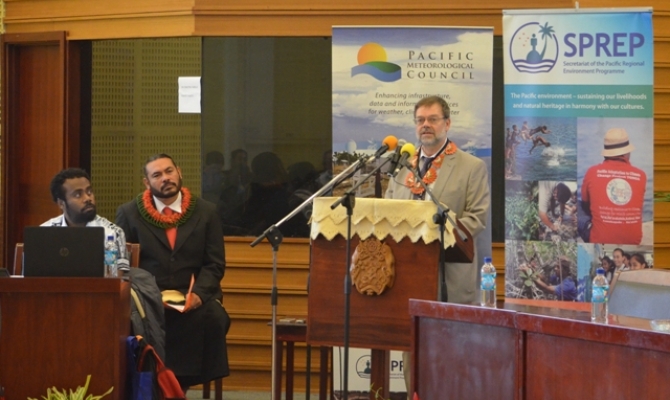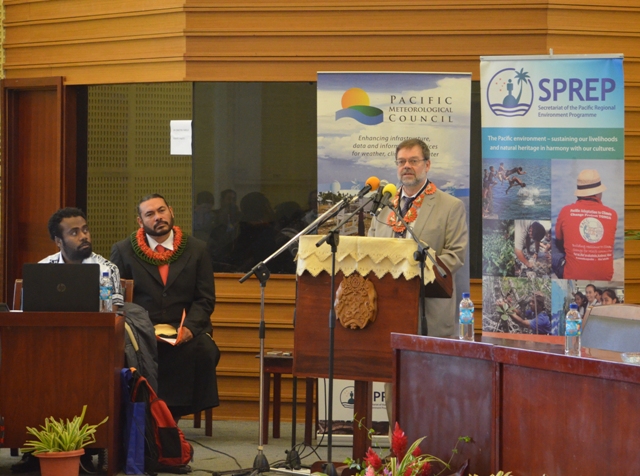
Climate Change Resilience
By Mr, Duane Mar of USP Journalism School and paper Wansolwara
20 July, 2015, Nuku’alofa, Tonga, PMC-3 - The northern European nation of Finland has used the 3rd Pacific Meteorological Council meeting in Nuku’alofa, Tonga this week to outline three significant global events that will guide the development of the meteorological services in the region and globally.
These three events are the Sendai Framework for Disaster Risk Reduction 2015-2030, the post 2015 Development Agenda discussions in September at the United Nations and the global climate change negotiations at the end of the year in Paris.
"In September we will agree on the Post-2015 Development Agenda and finally in December we should seal the new global climate agreement," said Dr. Matti Nummelin, the Senior Environmental Adviser to Finland’s Ministry for Foreign Affairs of Finland.

Nummelin said the Post-2015 Development Agenda has several issues closely related to the meteorological services.
"The Agenda raises among other things the maintenance and enhancement of food security, sustainable modern energy for all, combating climate change and desertification," he said.
Dr. Nummelin said the meteorological services play an important role in the promotion of resilience and disaster risk reduction.
“Early warning systems for climate hazards have a prominent role in ongoing climate change negotiations. Small island developing states have constantly kept this issue as one of their top priorities in the negotiations," he said.
The Sendai Framework for Disaster Risk Reduction 2015-2030 Framework stresses the need to strengthen the utilization of media, including social media, traditional media, big data and mobile phone networks to support national measures for successful disaster risk communication," he said.
Dr. Nummelin urged national meteorological services in the region to effectively engage the media in raising public awareness and understanding.
Another sector that will need the expertise of the meteorological services – in terms of accurate weather forecasts, are the aviation services, farmers, tourism industry, fisheries and governments.
Dr. Nummelin said a particular focus should also be for people living in rural communities and villages.
Finland currently support a regional project implemented by SPREP that focuses on reducing the vulnerability of Pacific island communities to the impacts of climate change. – #PacMC2015
Mr. Duane Mar is a journalism student of the University of the South Pacific, he writes for the Journalism paper – Wansolwara – www.wansolwara.com
This article was developed by a Pacific Media Team of Reporters currently providing coverage on the Third Pacific Meteorological Council in Tonga. This activity coordinated by SPREP is supported by a partnership including the Government of Tonga, SPREP, Finland Ministry of Foreign Affairs, Finnish Meteorological Institute (FMI), World Meteorological Organization (WMO) and the Pacific Media Assistance Scheme (PACMAS).
20 July, 2015, Nuku’alofa, Tonga, PMC-3 - The northern European nation of Finland has used the 3rd Pacific Meteorological Council meeting in Nuku’alofa, Tonga this week to outline three significant global events that will guide the development of the meteorological services in the region and globally.
These three events are the Sendai Framework for Disaster Risk Reduction 2015-2030, the post 2015 Development Agenda discussions in September at the United Nations and the global climate change negotiations at the end of the year in Paris.
"In September we will agree on the Post-2015 Development Agenda and finally in December we should seal the new global climate agreement," said Dr. Matti Nummelin, the Senior Environmental Adviser to Finland’s Ministry for Foreign Affairs of Finland.

Dr Matti Nummelin, the Senior Environment Adviser to Finland’s Ministry for Foreign Affairs of Finland
Nummelin said the Post-2015 Development Agenda has several issues closely related to the meteorological services.
"The Agenda raises among other things the maintenance and enhancement of food security, sustainable modern energy for all, combating climate change and desertification," he said.
Dr. Nummelin said the meteorological services play an important role in the promotion of resilience and disaster risk reduction.
“Early warning systems for climate hazards have a prominent role in ongoing climate change negotiations. Small island developing states have constantly kept this issue as one of their top priorities in the negotiations," he said.
The Sendai Framework for Disaster Risk Reduction 2015-2030 Framework stresses the need to strengthen the utilization of media, including social media, traditional media, big data and mobile phone networks to support national measures for successful disaster risk communication," he said.
Dr. Nummelin urged national meteorological services in the region to effectively engage the media in raising public awareness and understanding.
Another sector that will need the expertise of the meteorological services – in terms of accurate weather forecasts, are the aviation services, farmers, tourism industry, fisheries and governments.
Dr. Nummelin said a particular focus should also be for people living in rural communities and villages.
Finland currently support a regional project implemented by SPREP that focuses on reducing the vulnerability of Pacific island communities to the impacts of climate change. – #PacMC2015
Mr. Duane Mar is a journalism student of the University of the South Pacific, he writes for the Journalism paper – Wansolwara – www.wansolwara.com
This article was developed by a Pacific Media Team of Reporters currently providing coverage on the Third Pacific Meteorological Council in Tonga. This activity coordinated by SPREP is supported by a partnership including the Government of Tonga, SPREP, Finland Ministry of Foreign Affairs, Finnish Meteorological Institute (FMI), World Meteorological Organization (WMO) and the Pacific Media Assistance Scheme (PACMAS).